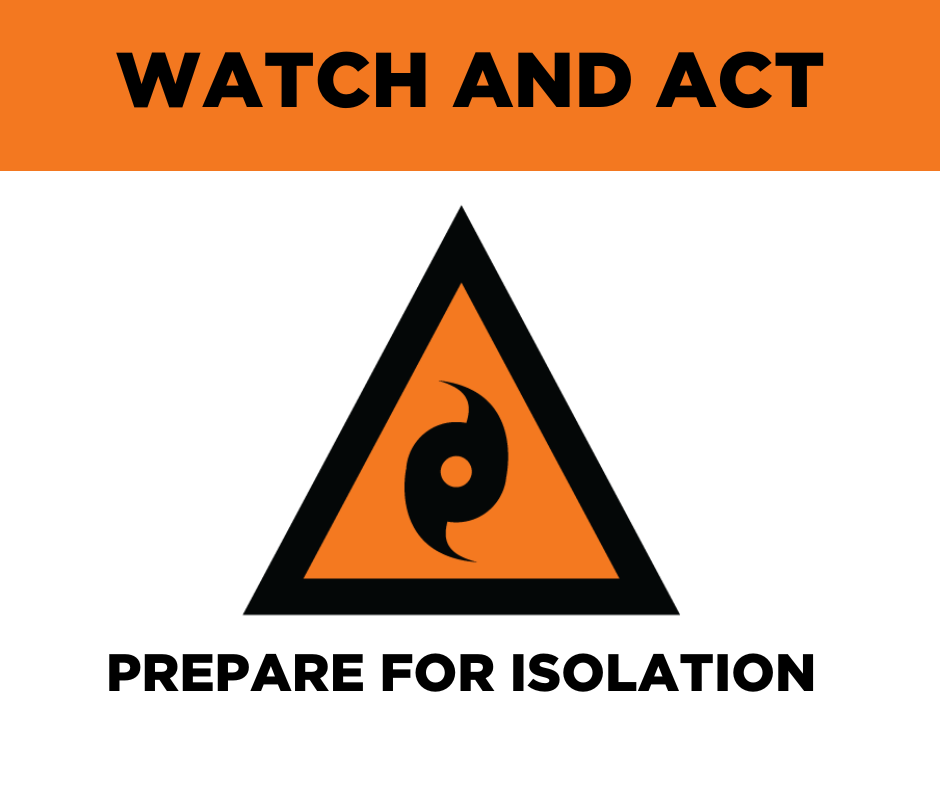PREPARE FOR ISOLATION – Cassowary Coast Region

PREPARE FOR ISOLATION – Cassowary Coast Region – Tropical cyclone as at 4pm, Monday 11 December 2023
Warning level: WATCH AND ACT
Warning area: Cassowary Coast Region
This warning is from Local Disaster Management Group / Cassowary Coast Regional Council.
People in the Cassowary Coast region should PREPARE FOR ISOLATION before Tuesday afternoon.
Very strong winds and heavy rain from Tropical Cyclone Jasper may cause damage across the Cassowary Coast. This could cut off access roads for several days.
Help may not be able to reach you quickly when roads are cut.
If your life is in danger, call Triple Zero (000) immediately.
For cyclone help, call the SES on 132 500 or download the SES Assistance QLD app.
Impacts
- Very strong winds will knock down trees, powerlines, blow roofs off some houses, and blow away anything not tied down outside. This is a risk to life.
- Heavy rain and storm surge may cause flooding in some places.
- Power, phones, internet and water might stop working. They could be out for a long time.
- Some places near the coast could get a dangerous storm surge and flood near the beach.
- Shops are closed.
- Roads could be blocked by fallen trees, powerlines or flood water.
What you should do
Finish preparing your property
- Fill your car with fuel, or charge it, and park it undercover. Do not park under a tree.
- Store or tie down outside items, like caravans, trailers, outdoor furniture, gas bottles, toys and play equipment.
- Move outdoor furniture inside or sink it in your pool so it doesn’t fly around in strong winds.
- Unplug all electrical items.
- Fill up containers and the bath with clean water for drinking. Turn water off to your house if you can.
- Board up big windows with plywood.
- Be ready to turn off power, solar, water and gas to your house if you can and if it is safe.
- Check your family, friends and neighbours know what to do. Help them if you can.
Finish making your emergency kit
- battery-powered radio to listen to warnings
- torch and spare batteries
- tinned and packet food and bottled water to last five days
- enough clothes for five days
- important medicine
- important papers (like ID, insurance papers and passports)
- first-aid kit
- mobile phone, charger and charged power bank. Finishing charging devices. Try not to use them now to save batteries.
- toilet paper, face masks and hand sanitiser
- if you have very young children, enough nappies for up to five days, wipes, bottles, formula or baby food. Plan to not have a fridge or microwave
- If you have a pet, enough pet food for five days, a lead and/or crate. Make sure they can be identified if they get lost.
- Some cash in case Eftpos or ATM’s are not working
Finishing preparing your shelter
- Find the strongest and safest room in the building you are in. This will be away from big windows. It could be a bathroom, walk-in wardrobe or hallway. Shelter here when the cyclone comes.
- Cover any windows in your safe room with a mattress or heavy blanket. This will protect you from broken glass if the window breaks. Shelter under the mattress if the roof comes off.
- Put your emergency kit in your safe room.
- If you have children make sure they are with you or an adult you trust.
- Do not use gas or generators inside. Fumes can be deadly.
If your home is not a safe place
- If your home in more than 40 years old or not well looked after, go to friends or family in a newer, stronger home. Weaker buildings can break more easily in cyclone conditions.
- If you live near the beach or a coastal waterway, go to friends or family in a strong home away from the water.
- Tell others where you are.
If you are camping or caravanning
If you are still in the area, prepare now to take shelter. It is too late to leave safely.
- Fully pack up your site. Put camping gear in your vehicle.
- Tie down your caravan. Find out how on the QRA website.
- Ask accommodation staff where to take shelter. Take your emergency kit and pets with you.
More information
- For all warnings, visit the Cassowary Coast Disaster Dashboard website regularly.
- Listen to your local radio station.
- For weather information, visit the Bureau of Meteorology Queensland website.
- For power outage information, visit the Ergon website.
- For traffic and road closure information, visit the QLD Traffic website or call 13 19 40.
The next update will be issued as the situation changes.
For cyclone help, call the SES on 132 500 or download the SES Assistance QLD app.
